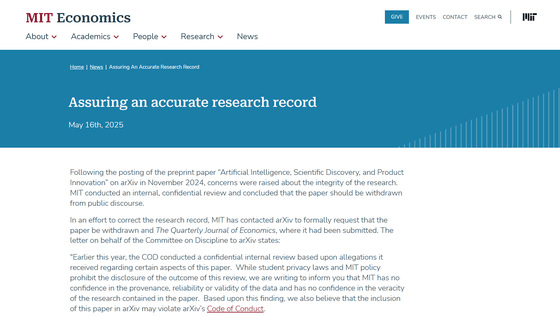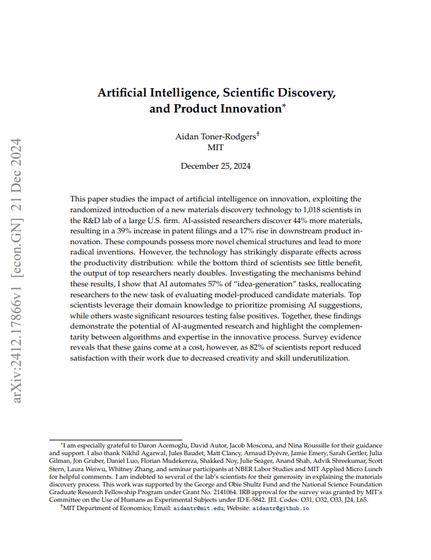MIT retracts paper claiming researchers made more discoveries with the help of AI tools

By
The Massachusetts Institute of Technology (MIT) has announced that it will retract a paper published by a graduate student on the arXiv repository of unpeer-reviewed research, which claimed that researchers assisted by AI tools are significantly more productive than those who are not.
Assuring an accurate research record | MIT Economics
https://economics.mit.edu/news/assuring-accurate-research-record

MIT disavows doctoral student paper on AI's productivity benefits | TechCrunch
https://techcrunch.com/2025/05/17/mit-disavows-doctoral-students-paper-on-ai-productivity-benefits/
MIT Says It No Longer Stands Behind Student's AI Research Paper - WSJ
https://www.wsj.com/tech/ai/mit-says-it-no-longer-stands-behind-students-ai-research-paper-11434092
The published paper, ' Artificial Intelligence, Scientific Discovery, and Product Innovation ,' is an empirical investigation of the impact of AI technology on scientific discovery and product innovation, in which an AI-based materials discovery tool was randomly introduced to 1,018 researchers and its effectiveness was examined.

According to the paper, researchers who received AI assistance discovered 44% more new materials than those who did not, which led to a 39% increase in patent applications and a 17% increase in product prototype development. In addition, AI automated 57% of researchers' 'idea generation tasks,' which resulted in researchers spending more time evaluating candidate substances presented by AI.
However, this effect was uneven, with more productive researchers at the top of the list more likely to benefit from AI, while lower-ranking researchers tended to waste effort on false positive candidates. According to a survey, 82% of researchers who used AI tools said that their job satisfaction had decreased due to a decrease in creativity and underutilization of skills. Although some satisfaction was due to increased productivity, many researchers experienced a decrease in job satisfaction overall.
In a statement released on May 16, 2025, MIT said it had raised serious concerns about the paper and, after conducting an internal, private investigation, had concluded that the paper should be retracted from public view.

By Niklas Tenhaef
MIT has stated that it 'cannot trust' the source of the paper, the reliability and validity of the data, and the veracity of the research content, and has requested that arXiv and the academic journal 'The Quarterly Journal of Economics,' to retract the paper. arXiv rules allow only authors to request a retraction of a paper, so MIT has instructed the authors to do so, but reports that this has not been done at the time of the statement.
'As an organization that values the accuracy of its research record, we have taken this step to prevent influential research from being misrepresented and distributed,' MIT said in a statement. The authors of the paper are no longer with MIT.
Professors Daron Acemoglu and David Autor, who were named in the paper's acknowledgements, said in a statement, 'Despite not being published in a peer-reviewed journal, this paper is widely known and discussed in the AI and scientific literature. We had concerns about the validity of this work and reported them to the appropriate departments at MIT. MIT conducted an internal investigation and determined that we could not have confidence in the provenance, reliability, and validity of the data, or the veracity of the research. We believe that the results of this paper should not be relied upon in academic or public discourse.'
'It's not just embarrassing, it's heartbreaking,' Autor told the Wall Street Journal.
Related Posts:







